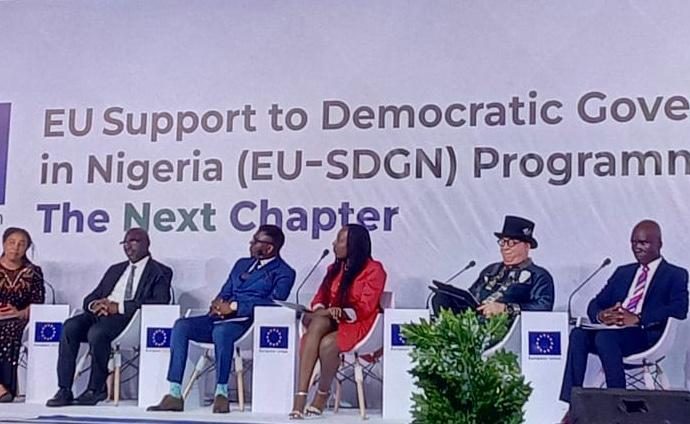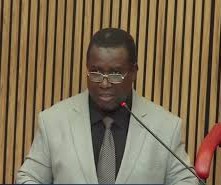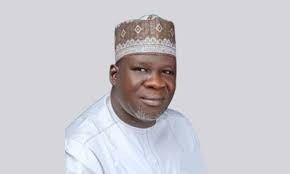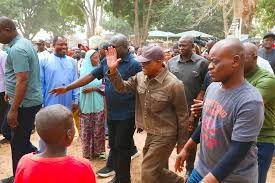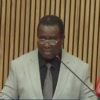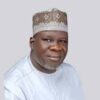The European Union has renewed its commitment to strengthen democratic governance in Nigeria with the launch of its second phase of funds aimed at providing support to targeted institutions and Civil Society Organizations involved in the electoral process. The fresh fund support to the tune of 39 million Euro will cover the period of 2022
The European Union has renewed its commitment to strengthen democratic governance in Nigeria with the launch of its second phase of funds aimed at providing support to targeted institutions and Civil Society Organizations involved in the electoral process. The fresh fund support to the tune of 39 million Euro will cover the period of 2022 to 2027 election circles.
At a two-in-one event in Abuja, the Delegation of the European Union (EU) to Nigeria and the ECOWAS in coordination with the Independent National Electoral Commission (INEC) formally announced the closure of the first phase of EU’s flagship democracy support programme in Nigeria and launched the second phase, which is expected to build on the successes of the past electoral cycles and take forward the very significant lessons of the past.
The closure ceremony and launch which took place on Monday, September 12, 2022, was with pomps and pageantries at the International Conference Centre (ICC), as the partners patted themselves on the back and expressed appreciation for the opportunity to learn from one another. The occasion was also an opportunity to gain an insight into the second phase of the programme.
In attendance were eminent personalities such as Ambassador Samuela Isopi, the EU Ambassador to Nigeria and ECOWAS, Laolu Olawumi, Programme Manager EU-SDGN, Prof. Mahmood Yakubu, Chairman INEC, Professor Bolade Eyinla, Chief Technical Adviser to the INEC Chairman, Prof. Muhammad Kuna, Technical Adviser to INEC Chairman, Mr. Rotimi Oyekanmi, Chief Press Secretary to INEC Chairman, former INEC Chairman, Prof Attahiru Jega and Prof. Anthonia Simbine, former INEC National Commissioner, among others.
Also in attendance were EU-SDGN Phase I & II implementing partners: European Centre for Electoral Support (ECES), The CLEEN Foundation, Policy and Legal Advocacy Centre (PLAC), Youth Initiative for Advocacy, Growth and Advancement (YIAGA), Africa, International Press Centre (IPC), Institute of Media and Society (IMS), ElectHER, Centre for Journalism Innovation and Development (CJID), BBC Media Action, The Albino Foundation, DAI, Westminster Foundation for Democracy (WFD), The International Institute for Democracy & Electoral Assistance (IDEA), Nigerian Women Trust Fund, Nigeria Institute of Policy and Strategic Studies (NIPPS) Kuru.
Other attendees, were Ladi Bala, National President of the Nigeria Association of Women Journalists (NAWOJ), Dr Joe Abah Country Director, DAI, Ms Cynthia Mbamalu, Head of Programmes, YIAGA Africa, Father Atta Barkindo Head of Secretariat, National Peace Committee, Dr Akin Akingbulu, Executive Director, Institute of Media and Society, Lanre Arogundade Executive Director, International Press Centre (IPC), David Anyaele, Executive Director, Centre for Citizens with Disabilities (CCD), delegates of Nigerian Institute of Public Relations (NIPR), Nigeria Press Council (NPC), The National Institute for Policy and Strategic Studies (NIPSS), Kuru, the National Secretary NGE, Iyobosa Uwuagiren, representatives of the National Youth Service Corps, International development partners, and journalists, among others.
Speaking at the official closure of Phase I and the launch of Phase II of the European Union Support to Democratic Governance in Nigeria Project in Abuja, E.U Ambassador to Nigeria and ECOWAS, Ambassador Samuela Isopi said, “Phase I of the programme contributed to the reform of the electoral process in Nigeria by building capacities, strengthening institutions, and contributing to the reform of the legal framework, political education, advocacy, political dialogue as well as inclusion. “This, with a particular focus on Independent National Electoral Commission (INEC), the National Assembly, Political Parties, Media, and the Civil Society”, she added.
She disclosed that the EU-SDGN II is providing a sum of 39 million Euros project support involving ten local and international partners in six specific components. Ambassador Isopi further reiterated that the E.U “as a long-standing partner of Nigeria, remains steady and committed to continue to support key institutions in efforts to enhance the quality and integrity of the electoral process and deliver credible elections.”
“Since 1999, E.U has committed over 150 million Euros to support Nigeria’s electoral process. We continue to call on key stakeholders to ensure effective contributions to the electoral process in order to strengthen Nigeria’s democracy.” Isopi says.
She further divulged that the identification and formulation of Phase II of the programme was done in consultation with the Nigerian Government and key stakeholders such as the INEC and civil society groups.
Speaking at the event, Chairman of the Independent National Electoral Commission (INEC), Professor Mahmood Yakubu noted that the support targeted at strengthening key democratic institutions, including INEC, has proved particularly useful in the efforts to deepen and consolidate democracy in Nigeria.
Prof Yakubu further said that it is his expectation that the success achieved during the implementation of the EU-SDGN Phase I, from 2017 to 2022, will be sustained and consolidated, while concerted efforts will be made to apply the lessons learned and address the identified challenges in the course of implementing the EU-SDGN II from 2022-2027.
He restated his belief that the EU and INEC will continue to work together towards democratic consolidation in Nigeria especially for the successful conduct and efficient delivery of the 2023 and 2027 general election.
In her welcome remarks, Olawunmi Laolu, Programme Manager of the EU-SDGN Project, emphasised that the main aim of the project is to identify reform-minded institutions and provide them with the necessary support to enhance the democratic process in Nigeria.”
The event had two panel sessions, one of which focused on the “EU-SDGN’s Contribution to Nigeria’s Democratic Consolidation.” The discussants included Mr. Jake Epelle, CEO, Albino Foundation, Dr. Musa Umar, National Institute of Peace and Strategic Studies, Ms. Brenda Nwosa, Programme Officer, Policy and Legal Advocacy Centre (PLAC), Mr. Lanre Arogundade, Executive Director, International Press Centre (IPC) and Okoro Chigozirim, Programme Manager, CLEEN Foundation. It was moderated by Manji Wilson, Deputy Project Coordinator, European Centre for Electoral Support (ECES).
In terms of EU-SDGN Phase I significant outcomes, Mr. Arogundade said the results achieved in relation to engagement with the media reflected the correctness of the philosophy of ‘looking back to step forward’ that was adopted in designing the activities. According to him the approach entailed the identification of gaps in previous media coverage and reportage of elections especially as contained in the final report of the European Union Election Observation Mission to Nigeria.
Arogundade elaborated that, in designing the intervention of component 4-support to the media, IPC’s media monitoring coverage of 2015 elections revealed a number of gaps. Particularly, the prevalence of hate speech, in the way and manner media organisations reported some of the presidential candidates.
According to him, the goal this time around was to have a multimedia stakeholder buy-in for credible elections in terms of its fairness, access, inclusive focus, and holding the media accountable.
He further highlighted that, monumentally, unlike in 2015 when eight media organisations came together and endorsed the Nigerian Media Code of Election Coverage, in 2018, under the EU-SDGN Phase I Project, they were able to bring together all the umbrella media organizations and as a matter of fact, over three hundred individual media houses endorsed and subscribed to the Nigerian Media Code of Election Coverage, which was a statement of commitment to provide credible information so that citizens can make informed choices in the electoral process.
The fact that we engaged one of the key stakeholders in the electoral process, the National Broadcasting Commission, which regulates broadcast media—cannot be underestimated,” he stated. “The broadcast media has a profound impact on the population during elections.”
Arogundade further explained that radio and television, with their vast and simultaneous reach to millions of viewers and listeners, were central to the effort. The goal was to help the regulatory body better understand its role under existing legislation. As a result of these engagements, the institution was prompted to review the laws governing media regulation.
In response to questions about efforts to review the Nigerian Broadcasting Code (NBC), Mr. Arogundade explained that it is an ongoing process. He noted that they had been involved in reviewing the amendment to the act that established the National Broadcasting Commission in the National Assembly. He further mentioned that they had participated in public hearings, during which they raised concerns about certain provisions. “We are advocating for regulations that, as much as possible, should strengthen broadcast media, ensuring their freedom, independence, and a certain level of social responsibility,” he said.
Addressing the alleged breach of the code, Arogundade insisted that the issue must be tackled appropriately. He emphasised that the National Broadcasting Code itself should serve as a comprehensive system, one that has not yet fully incorporated input or agreement from stakeholders, including those from the EU-SDGN II project.
Elaborating on the impact of the media, Arogundade highlighted the significant role broadcast media plays in shaping public opinion, especially during elections.
He explained that, recognising the vast audience reach of radio and television, the IPC engaged the regulatory body—a move that, for instance, prompted the reviewing of the law.
The Executive Director highlighted the key takeaways as tangible outcomes of the interventions made. According to him, IPC could point to concrete results—most notably, a marked improvement in media professionalism. For instance, unlike in 2015 when political debates had limited reach and often featured only two or three candidates, by 2019, broadcast media organizations and others had expanded their efforts. They organized more inclusive debates, providing greater exposure for presidential candidates not only at the national level but also across various states.
According to him, one of the key challenges faced by the EU-SDGN Component 4 – Support to the Media program was that it extended beyond journalists and media professionals to also engage female candidates. Bringing these women together for capacity-building sessions proved difficult, largely due to their strained relationship with the media and concerns about how they are portrayed.
He further noted that domestic challenges also arose, particularly because the trainings were held too close to the elections, making logistics and travel difficult for some participants. Nevertheless, these obstacles were eventually overcome, and the program successfully trained and engaged around 120 female candidates on strategic communications and media relations.
Arogundade highlighted that one of the major success stories of Component 4 was the election of about 10 female trainees into various Houses of Assembly and the House of Representatives. He noted that these women went on to demonstrate strong leadership, with many heading key committees—such as those on budget and appropriation—thereby proving that women can perform effectively in legislative roles. He added that these achievements will be carried forward into the next phase, EU-SDGN II, emphasising the critical role the media can play in supporting the election of capable candidates.
The second panel session, discussed the “Challenges and Opportunities for a Credible 2023 General Elections in Nigeria” featured discussants Prof Attahiru Jega, Former, Honourable Chairman, INEC, Prof Anthonia Sibine, Former National Commissioner, INEC, Dr. Joe Abah, Country Director, DAI, Ms Cynthia Mbamalu, Head of Programmes, YIAGA, Africa, Fr. Atta Barkindo, Head of Secretariat, The National Peace Committee and was moderated by Seun Okinbaloye, Channels TV.
In response to a panel question on the impact of insecurity on elections, Fr. Atta Barkindo remarked that an increasing number of unknown individuals, including those online, pose a serious threat to national stability. While acknowledging the limitations of what can be done, he emphasized the importance of focusing on prospects and opportunities, particularly the integration of intellectual capacity into governance, extending beyond just the electoral process.”
He warned that the progress made should not be taken for granted, especially considering the volume of data and evidence gathered through the various processes established since 2019. He added that while the political class has posed challenges, the current landscape demands greater accountability today, numbers and evidence matter. As a result, political leaders must rise to the occasion by integrating intellectual capacity into their approach to governance.
Fr. Atta Barkindo emphasised that, from the perspective of the National Peace Committee, engaging with the political class is not just important, but critical—particularly because it directly affects the committee’s ability to mediate and engage key stakeholders. Reflecting on the 2019 elections, he noted the extreme difficulties faced by the committee. Constitutionally, only INEC is authorized to announce election results, yet tension began to rise even before official results were released. In Bauchi, for instance, violence had already broken out. The committee had to urgently reach out to senior members of various political parties, many of whom were circulating and reacting to fake results found online, especially on platforms like Facebook.
Fr. Barkindo warned that if the spread of unofficial and misleading results online is not effectively managed, the consequences could be more destabilizing than banditry. He stressed the need for stronger information checks and controls. While not all issues will be resolved through formal processes, he noted, some will require mediation and engagement at the highest levels of government—an effort he described not only as necessary but as an opportunity for institutional growth.
Turning to the panel discussion on prospects for the 2023 elections, Dr. Abah highlighted a sense of discontent that had been simmering beneath the surface—eventually manifesting in the End SARS protests. What began as a movement against police brutality evolved into a broader demand for better governance and a more accountable state. He noted that this shift had motivated a significant number of young people to register to vote, and he expressed hope that many more would show up to cast their ballots in the upcoming elections.
Chigozirim Okoro, Programme Manager at CLEEN Foundation, explained that Component 5 of the program focused on two key thematic areas: election security and inclusivity specifically, the inclusion of persons with disabilities and other vulnerable communities. To achieve this, she noted, they took deliberate steps to ensure we got it right. One notable outcome, she highlighted, was that 75% of peace agreements were actually implemented by political actors, particularly in the lead-up to the 2019 general elections.
The ten partners being funded under the EU-SDGN II project are DAI, Yiaga Africa, International Press Centre, Policy and Legal Advocacy Centre (PLAC), Nigerian Women Trust Fund, ElectHER, The Kukah Centre, IDEA, The Albino Foundation and Institute for Media and Society (IMS).
3 comments

